Everybody Loves Annie
Sitcoms have never looked as sinister, thanks to the actress formerly known as Alexis Rose. In the new dark comedy Kevin Can F**K Himself, Murphy stars as a housewife over the bullshit—but she’s as adored as ever. No laugh track required.
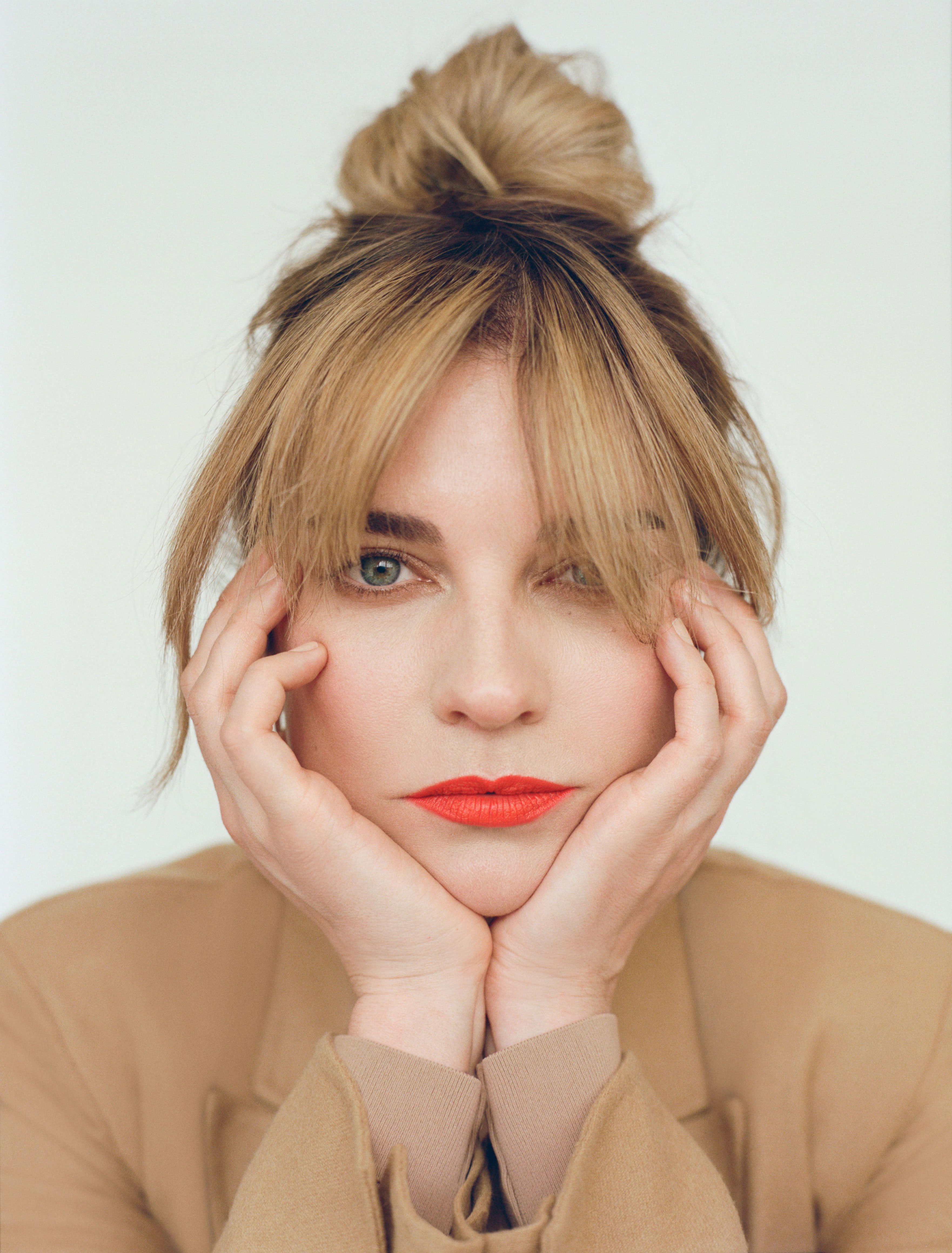
VERSACE BLAZER, $3,975, AND TURTLENECK, $995. ON SKIN: NEUTROGENA RAPID FIRMING COLLAGEN TRIPLE LIFT FACE SERUM.
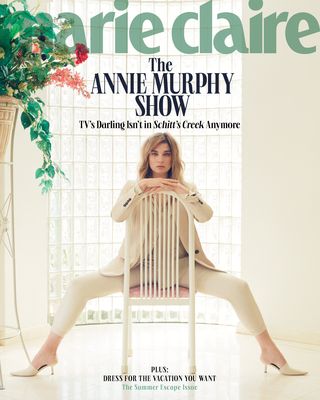
At the end of 2019, Annie Murphy laid out her plans for the year ahead: read 40 books; hike; write. She dubbed 2020—in an interview with this very magazine—her year of creativity. Instead, she won an Emmy and binge-watched five seasons of 90 Day Fiancé.
Those are unrelated incidents, but they’re nonetheless demonstrative of the seemingly opposing sides of Murphy. The first: a glamorous, highly sought-after actress who catapulted to stardom as Schitt’s Creek’s Alexis Rose. The other: an exceedingly affable Canadian who envies pandemic-borne sourdough bakers for being “beautifully crafty.”
It’s a Sunday morning, and Murphy is seated in the chic Manhattan hotel room where she’s been residing while filming the second season of the popular Netflix series Russian Doll. She’s wearing a kelly-green version of Lady Di’s black-sheep sweater. Have the designers behind the jumper (Warm & Wonderful in collaboration with Rowing Blazers) sent Murphy a yet-to-be-released colorway, hoping that television’s newest darling will reinvigorate the look first made iconic by the people’s princess in the ’80s?
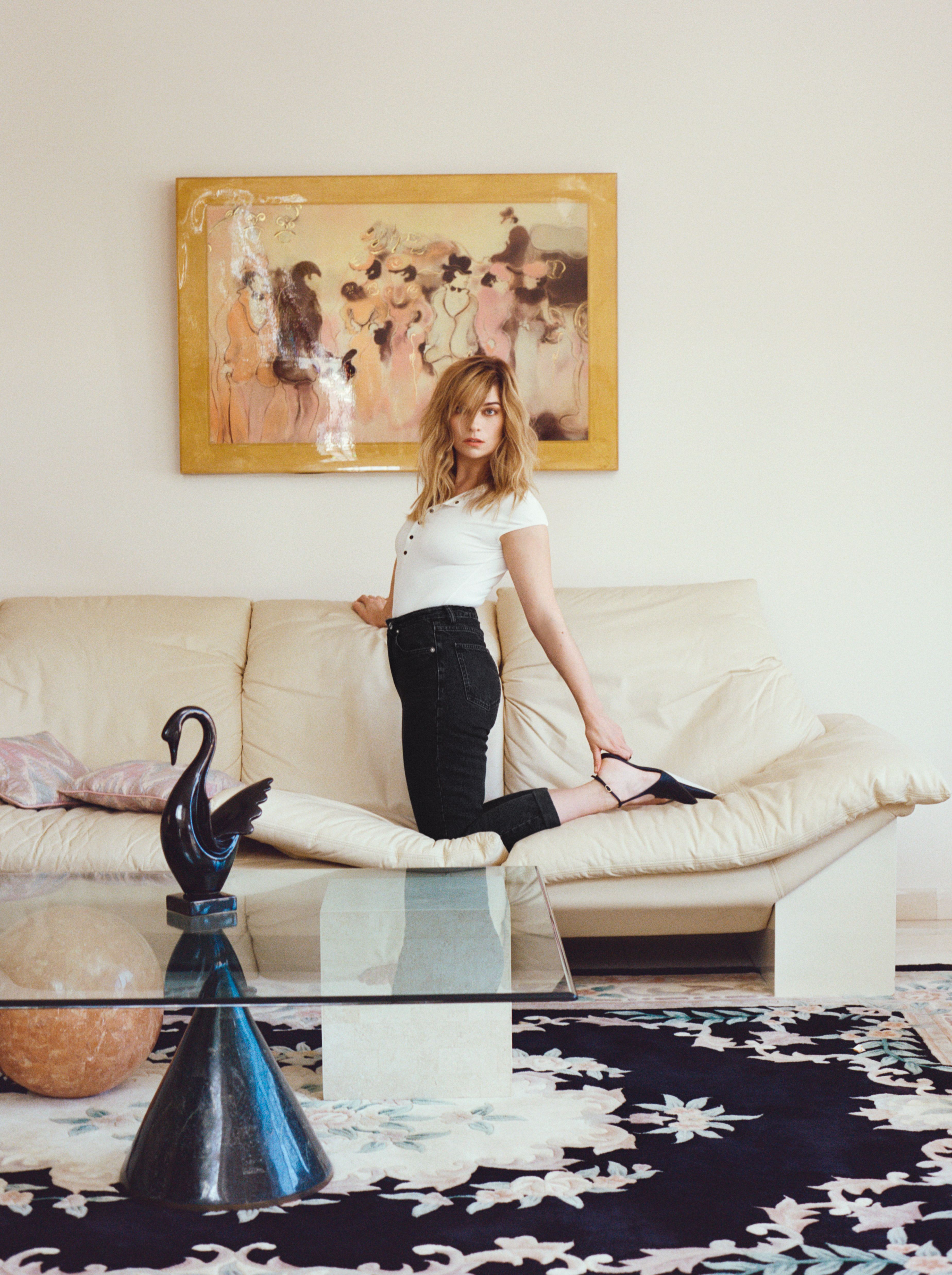
ALAÏA BODYSUIT, $1,240; LAUREN RALPH LAUREN JEANS, $100; KHAITE SHOES, $780.
Alas, no: “My best friend’s mom made this,” she excitedly shares of the knitwear. Murphy commissioned the piece because “what a fucking statement.” (She clarifies: “[It was a statement] when Diana wore it. Not when I wear it. )
That Murphy seems unaware of the power she also wields—for instance, to make fashion statements—does mark her as a bit of a black sheep in Hollywood. But it’s not false humility or an identity crisis. She just happily exists in a limbo of sorts, between capital-f Famous Person and grounded artist looking for work.
Before her 2020 plans were derailed, she was doing just that. After wrapping the final season of Schitt’s, she temporarily relocated to Los Angeles for pilot season—her first time auditioning in six years. “It’s really a daunting place to be, to have done this one character—and on a show that has become so beloved—for such a long time. So I was like, ‘Oh, fuck, can I do anything else?’”
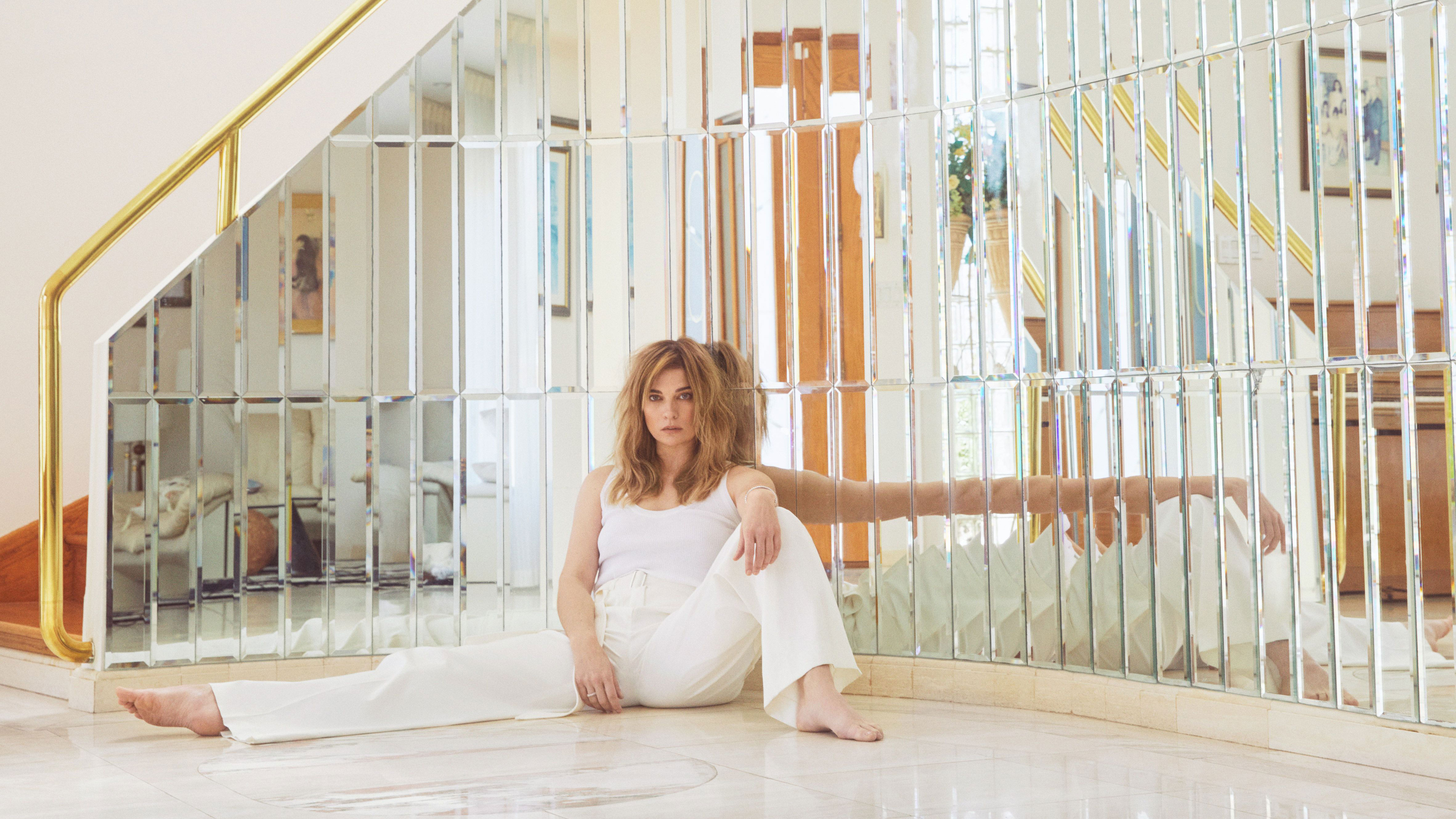
MAX MARA TOP, $595, AND PANTS, $845; CARTIER RING, $2,270, AND BRACELET, $9,350.
The job prospects felt “bleak.” Like many actors who become synonymous with their on-screen counterparts, Murphy insisted her next role be different and challenging. But the parts coming her way either felt a little bit Alexis or were just plain bad. “There was a lot of me reading scripts, being like, ‘Oh, man, is this what’s getting made right now? It’s not about anything. It’s not exciting.’”
Stay In The Know
Get exclusive access to fashion and beauty trends, hot-off-the-press celebrity news, and more.
Enter Kevin Can F**K Himself, an eight-episode dark comedy premiering on AMC on June 20 (and on AMC+ on June 13). In the series, created by Valerie Armstrong, Murphy plays Allison McRoberts, a working-class wife who desperately yearns for something outside the four walls of her home—something more beautiful, more invigorating, more loving. Something her schmuck of a husband can’t understand, much less provide, because he’s too preoccupied with his Patriots paraphernalia. (The show is set in Worcester, Massachusetts.) So she plots his murder.
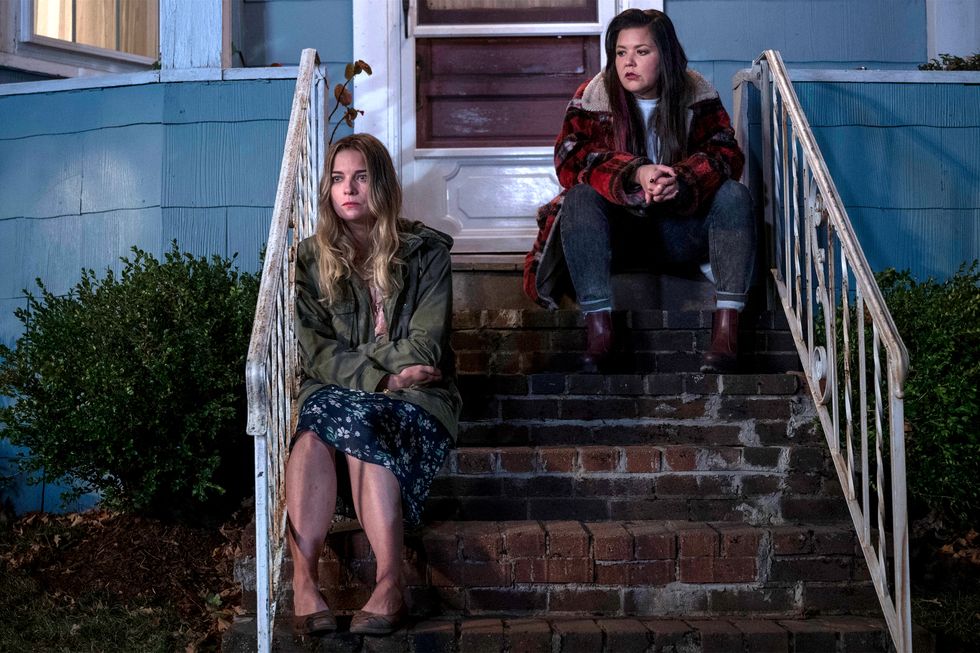
Murphy in the fateful, single cam porch scene with Patty (Imboden) that landed her the role of Allison.
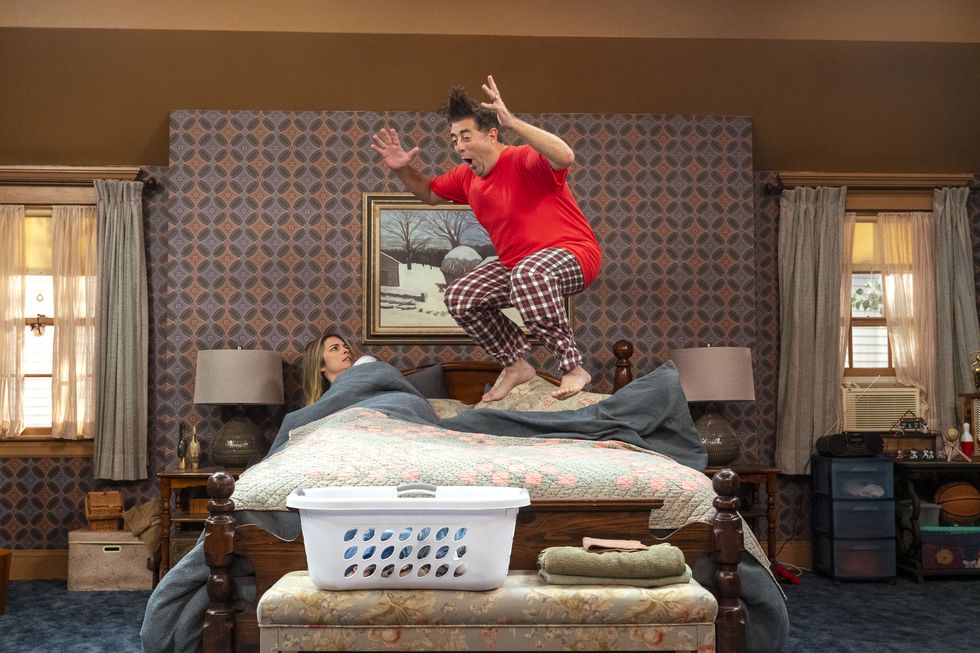
Eric Petersen as the titular and dim-witted Kevin, shown in the stereotypical sitcom universe.
The show turns surreal thanks to Armstrong’s concept: toggle between multicam setups (used in the laugh-track-scored scenes often set in the McRoberts house, where Allison’s needs and wants are subservient to her husband Kevin’s) and single-cam shots (to capture Allison’s increasingly distraught perspective). As Allison’s eyes are opened to the truth of her relationships, Kevin’s sitcom world reveals itself to be claustrophobic and cruel.
It struck all the right notes for Murphy. Through the alternating vantage points, “you get to see the impact that these so-called jokes are having on a human woman. These sitcoms have shrouded misogyny and racism and bigotry and sexism under laugh tracks.” Allison’s demeanor felt like just enough of a departure from Alexis’s. “She’s a very angry, very frustrated character, as opposed to Alexis’s bright, cheerful character. So it checked all the boxes for what I was looking for.”
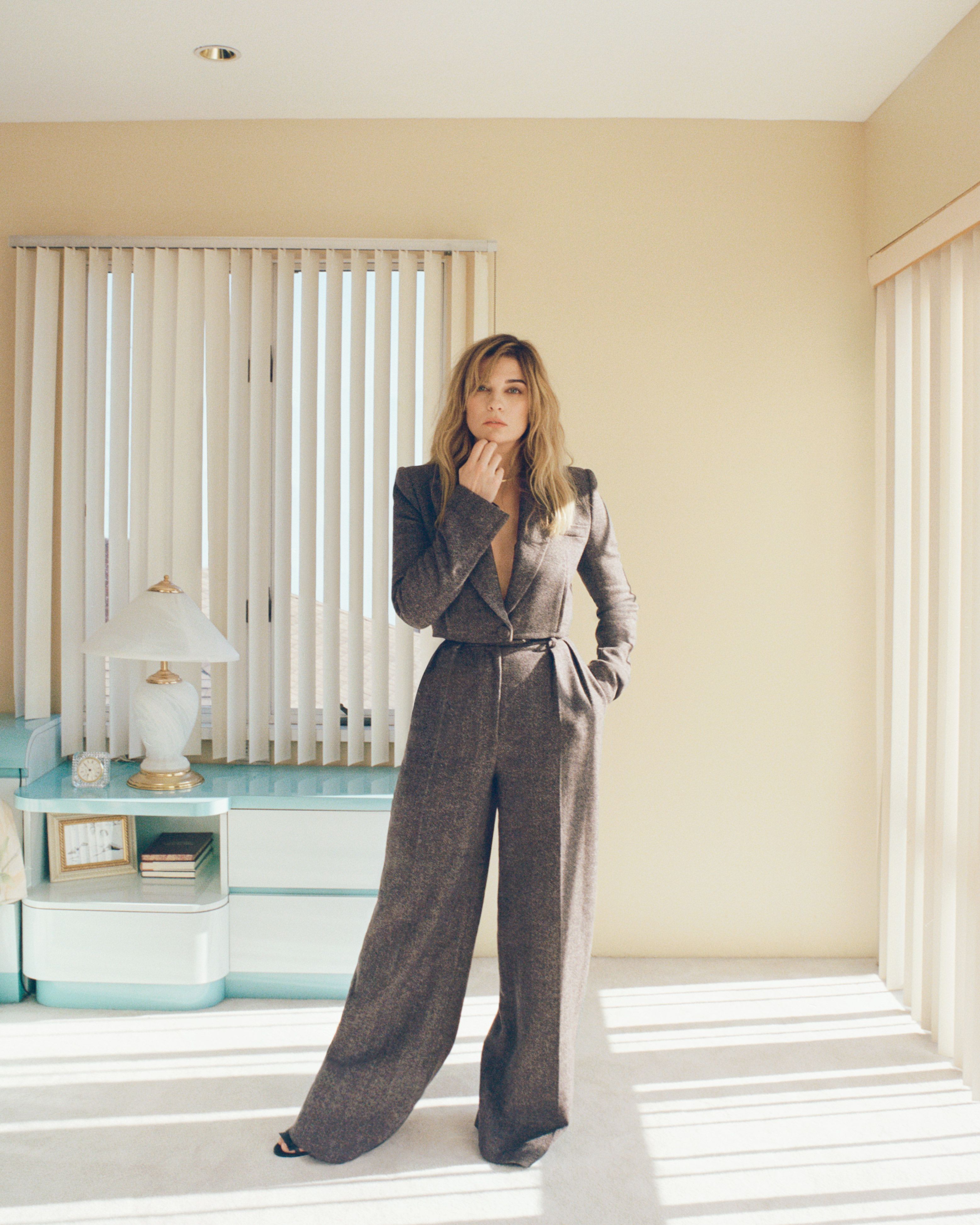
KHAITE BLAZER, $1,680, AND PANTS, $1,480; CARTIER NECKLACE, $13,800; PIERRE HARDY SHOES, $795. ON HAIR: TRESEMMÉ DRY TEXTURE FINISHING MIST.
Armstrong admits she didn’t expect Murphy to have the range to go from Schitt’s to a different kind of suburban sitcom hell. It took an audition, during which Murphy read a particularly intense scene, for the writer to see the actress’s potential.
The easiest way to get you to root for someone is to cast Annie Murphy.
“The scene ends with [Allison] saying, ‘Fuck.’ In almost every audition, people had done it exactly as I had written it: at just a total loss and sort of while laughing,” Armstrong remembers. “And I watched Annie’s tape and she said it with such rage and conviction after doing this wonderfully light multicam scene. And I was like, ‘Holy shit, who’s that? I did not see that woman on Schitt’s Creek.’”
Allison’s back and forth between quintessential homemaker and woman who wants to burn it all down is what propels the show’s narrative. But it’s Murphy’s ability to balance on the knife-edge—of hopeful and despondent, angry and ambitious, flawed and funny—that accomplishes the show’s job: making the sitcom wife a real person.
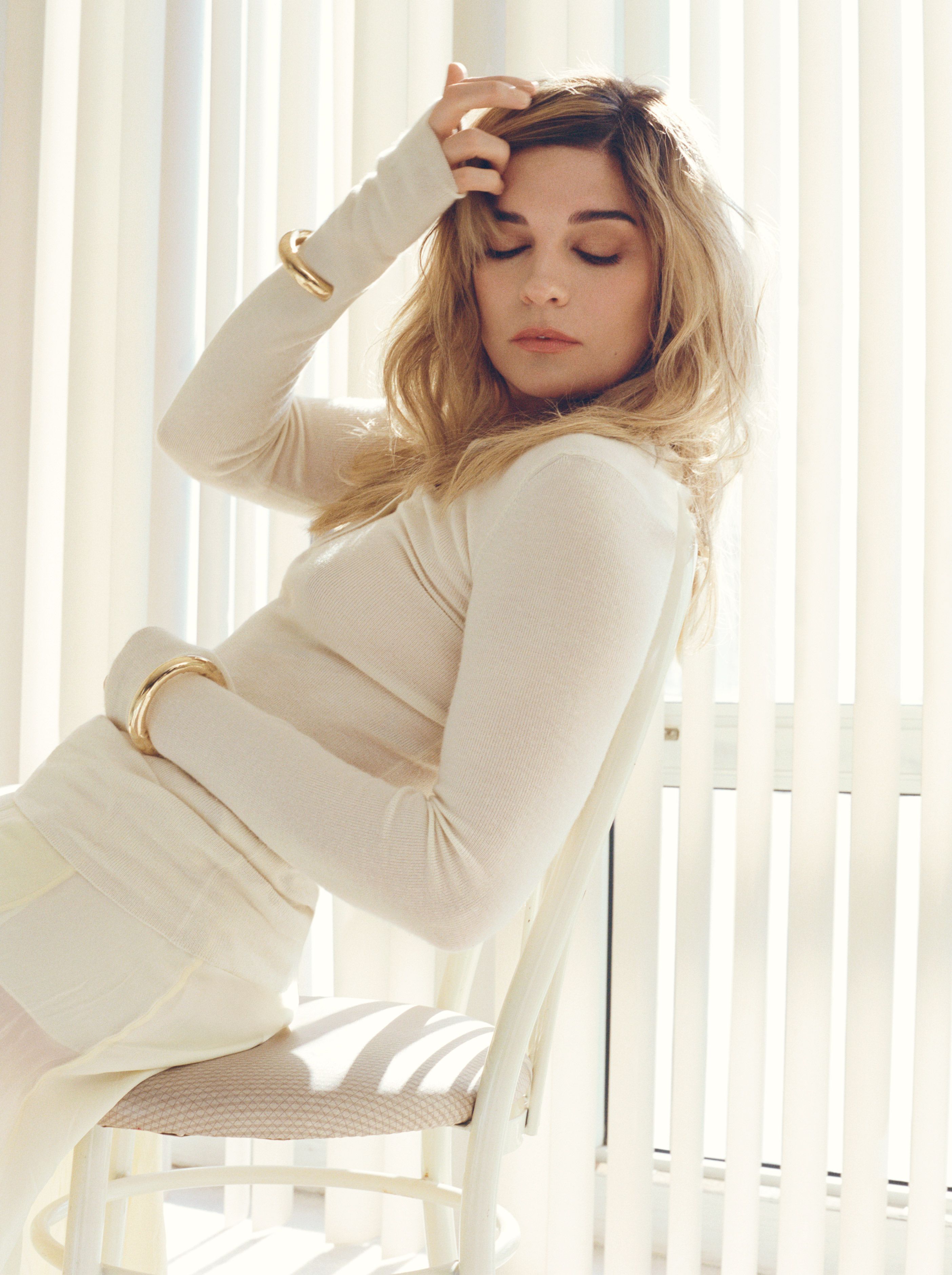
SALVATORE FERRAGAMO SWEATER, $1,450, AND SKIRT, $2,400; JENNIFER FISHER BRACELET(S), $295.
Armstrong explains: “We described [Allison’s] operating procedure as ‘Thank you, sorry, thank you.’ Somebody who’s trying to do something for themselves but is held back by all of these notions she has about herself … [and] she had to play frustrated as funny because we couldn’t have those moments of rage be a pure downer.
“We wanted to root for someone. And the easiest way to get you to root for someone is to cast Annie Murphy.”
Even if you never actively watched multicam family sitcoms in their ’90s heyday—Murphy didn’t—their archetypes have likely burrowed into your psyche, their legacy permeating pop culture, like it or not. There’s the beer-guzzling Joe Schmo married to the likes of Leah Remini or Patricia Heaton—which is to say beautiful by even Hollywood standards—who is best defined by her naggy ways and buzzkill attitude. The genre is centered so firmly on the husband, you need only look to the series’ names for proof: Everybody Loves Raymond. According to Jim. The Dick Van Dyke Show. Consider even the ground-breaking I Love Lucy: The words of the title, after all, are from Ricky’s adoring perspective. There’s enough material there that Kevin Can F**K Himself could’ve stopped at simply flipping those tropes. But Armstrong chose to peel back more layers, settling not for, as she explains it, “What are the circumstances that led the wife here?” but rather what psychology keeps a woman sticking around.
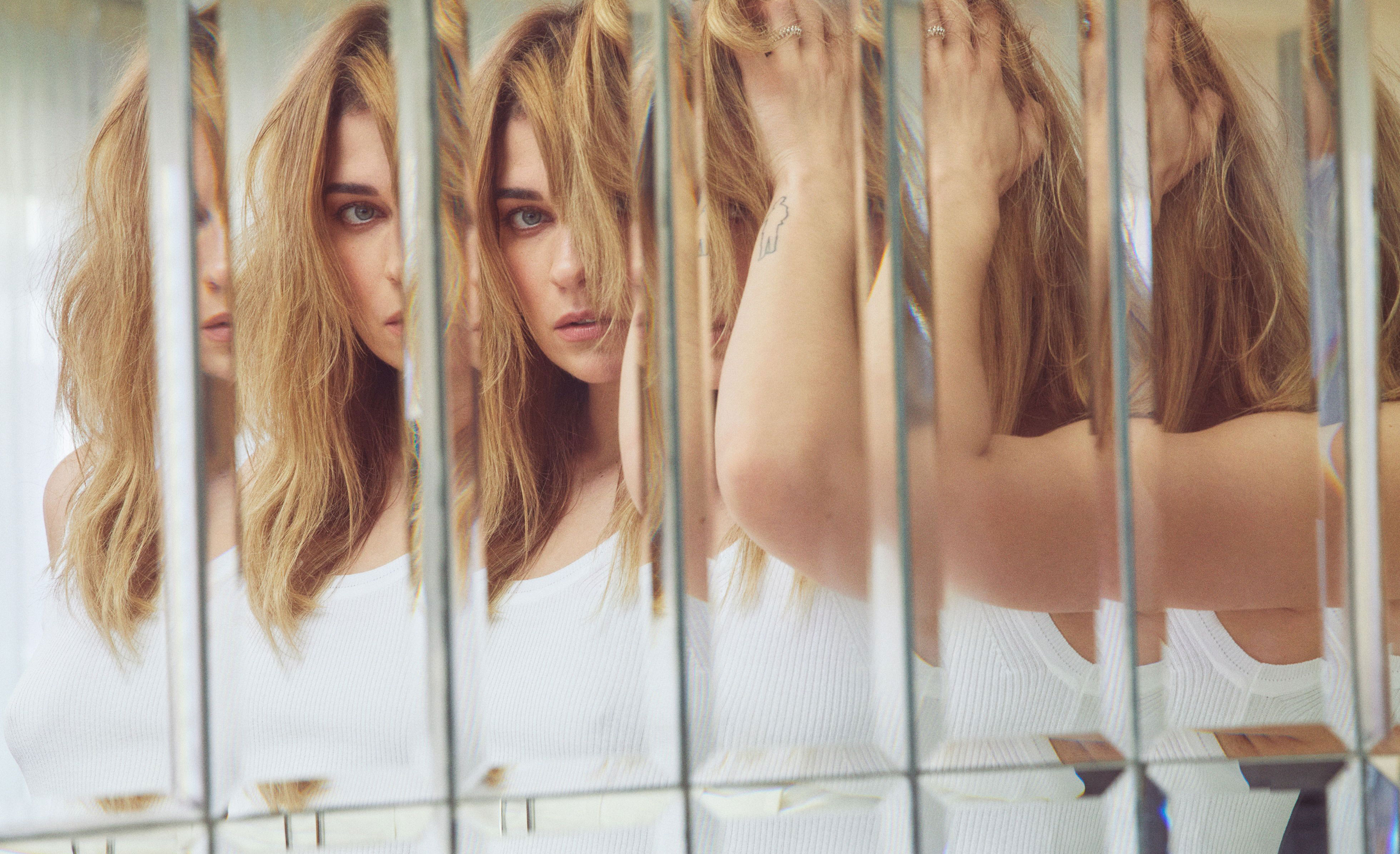
"Both Allison and Alexis have drive and aspirations and want more for themselves and go to great lengths and make great sacrifices to make those changes. I think that's the connector between the three of us."
That meant exploring subjects like mental health—not in the Instagram-platitudes way, but in a way that real women may approach it. “Allison sees therapy initially as a sign of weakness and giving up. Like a selfish thing,” Murphy says. “I felt that way [during] my first few therapy sessions. I wanted to ask the therapist, ‘What about you?’” Murphy doesn’t shy away from speaking about her own mental-health regimen, which includes therapy and antidepressants—practices she put into place as a response, in part, to the toll of Hollywood rejection. “You have to be able to unburden yourself of some of these fears and anxieties. It’s not a sign of weakness. It’s just being a human. It’s okay to need help being a human.”
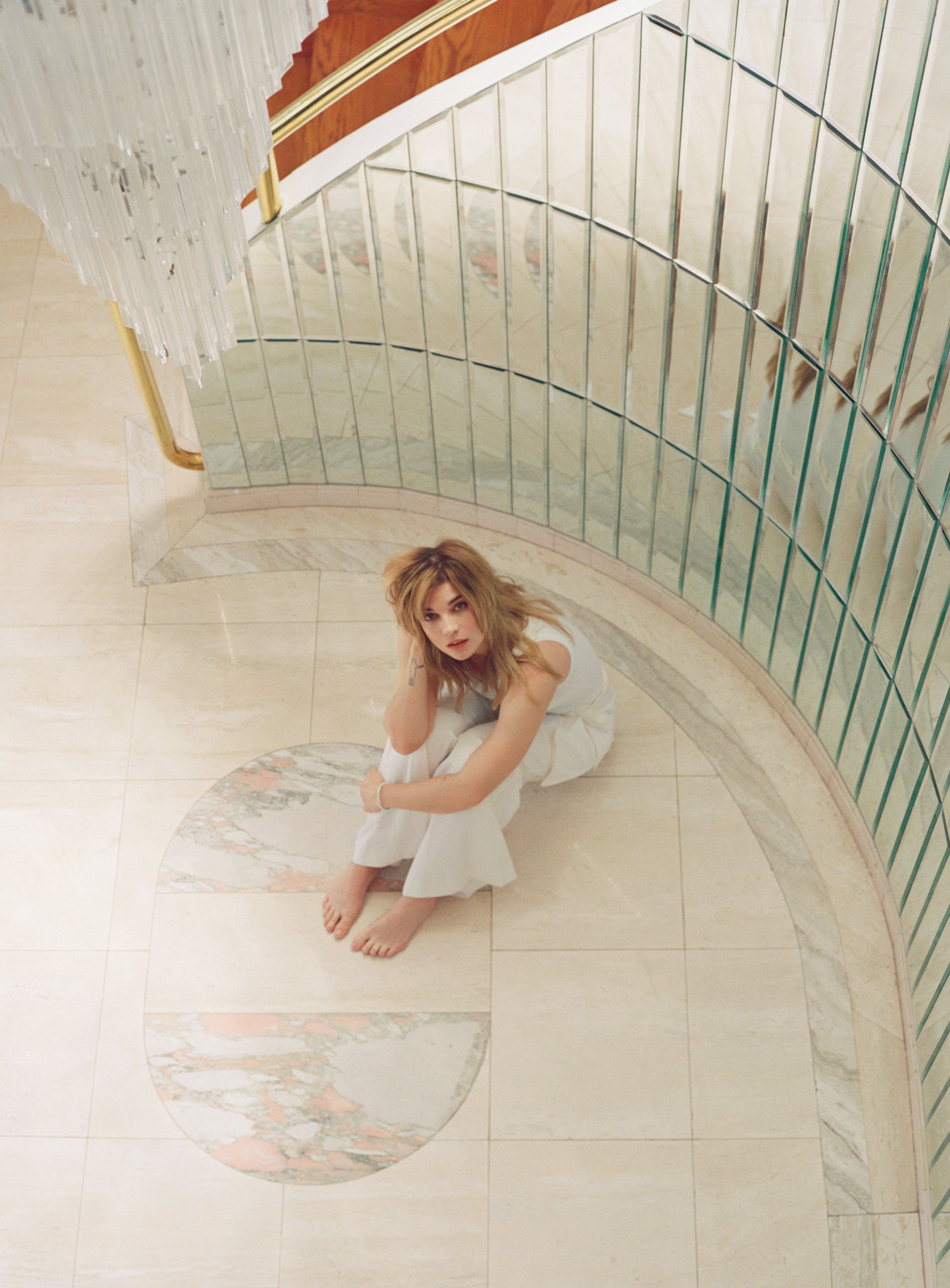
Murphy's favorite reality TV shows are those that are "as unscripted" as they can be: "90 Day Fiancé, for example, really does seem like it's just a bunch of cameras rolling on very unique situations and very interesting characters."
For Allison, help comes at the (initially unwilling) hands of her surly neighbor, Patty O’Connor (Mary Hollis Inboden). In order to save herself, Allison must re-examine her female friendships, ultimately showing Patty how she’s been perpetuating misogyny. “[Kevin Can F**K Himself] presents as a show about a toxic marriage, but to me it’s about how women can get each other out of toxic situations,” Armstrong explains.
That female camaraderie permeated the atmosphere behind the scenes. Having a cast and crew led and dominated by women created a more inclusive and collaborative environment, Murphy says. “There didn’t seem to be any kind of status.”
Armstrong says Murphy’s “no ego” attitude was a large part of that. It was Murphy, Armstrong reveals, who gave Allison an unexpected comedic edge in the multicam universe. “It felt like the injustice of the wife: They’re set-up machines; they don’t ever get [to tell] the joke. And once [Annie] came on board, it was her idea: ‘Can’t [Allison] make jokes and have no one get them? Isn’t that worse?’… It’s one of my favorite things in the show.”
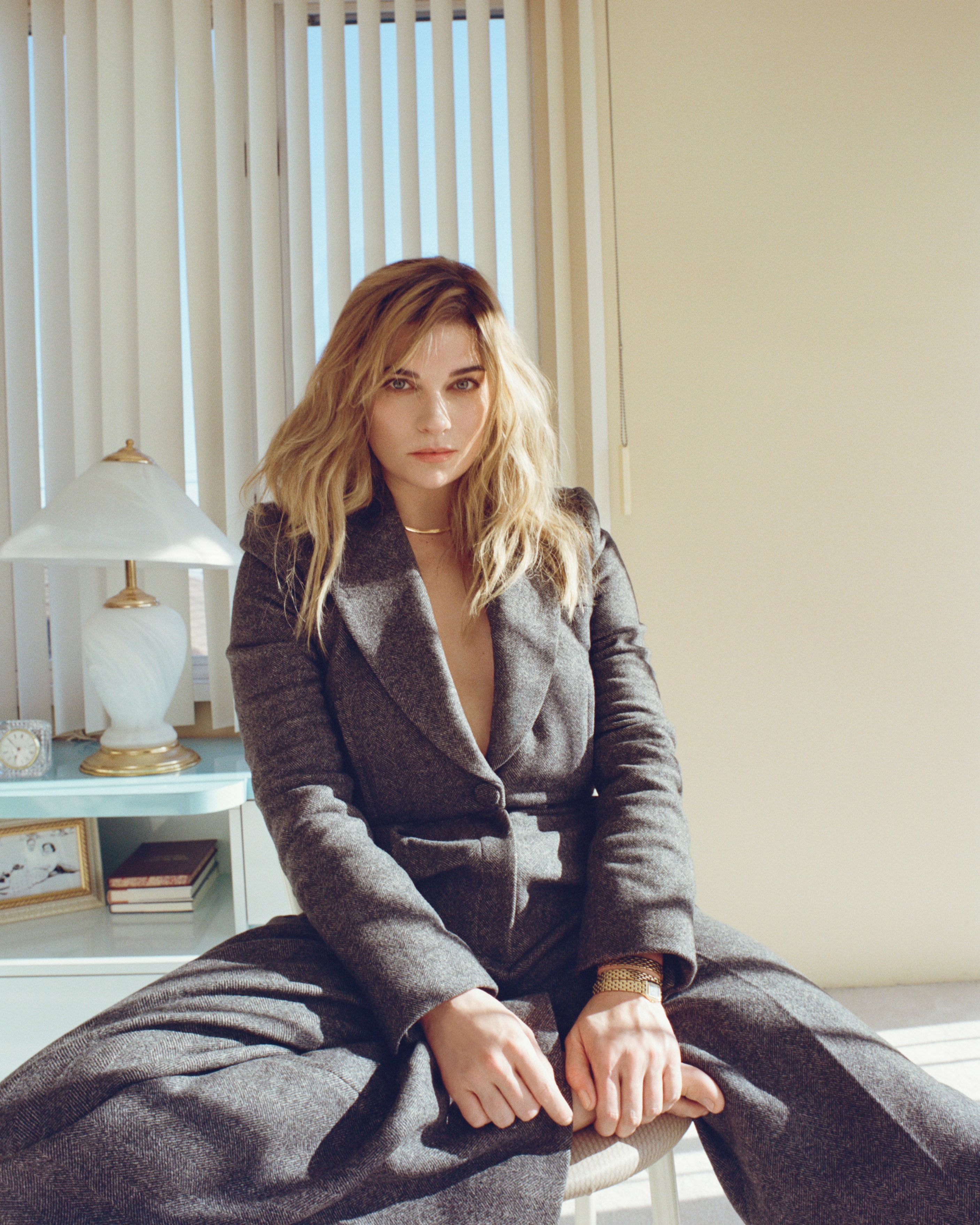
"I grew up in Ottawa, Ontario. It was truly pretty idyllic and drama free."
For her part, Murphy credits her brand of approachable professionalism to Schitt’s Creek, where she says she learned how to be a good leader on and off set at the knee of her on-screen parents, Eugene Levy and Catherine O’Hara.
Like any good mother, O’Hara has mostly sweet/embarrassing anecdotes to share about the woman who played her daughter for half a decade. Murphy apparently loves Dr. Pimple Popper (to O’Hara’s disgust) and is “an open spirit.”
O’Hara links Alexis and Murphy so closely, it’s sometimes difficult to tell who she's referring to. Ultimately, it doesn’t matter, because as O’Hara explains it, Alexis was who she was because Annie is who she is. “[Annie] came in open, assuming nothing. It’s the most beautiful thing to see someone get the opportunity to do what they didn’t even know they’d always been capable of doing.”
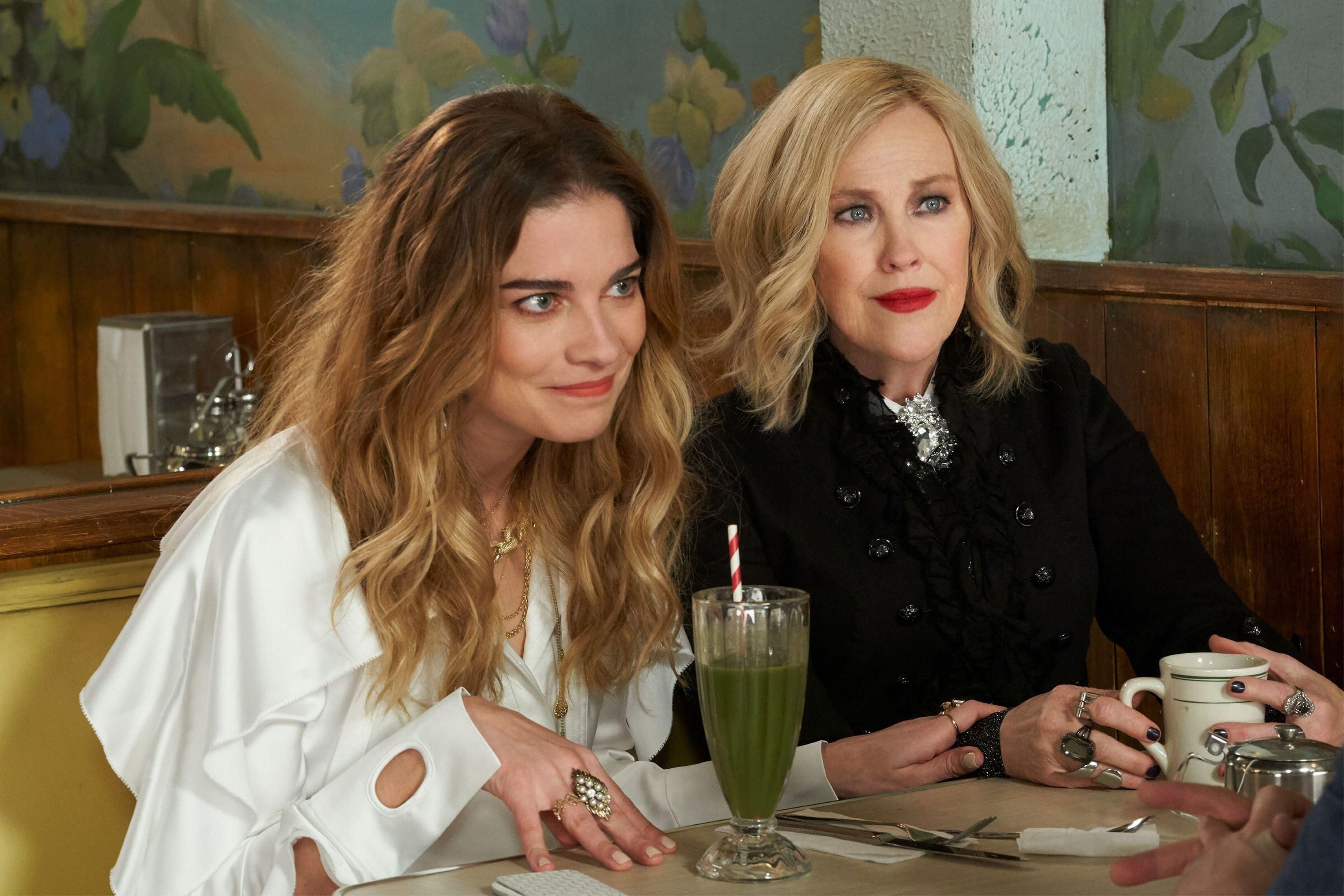
Murphy and O’Hara as discordant mother-and-daughter Alexis and Moira Rose.
She suggests that cocreator/showrunner/star Daniel Levy and the writing staff’s decision to squash a storyline in which Alexis and Ted (Dustin Milligan) would have a double wedding with David (Daniel Levy) and Patrick (Noah Reid) came because of the level to which Murphy had elevated her own character. Because of the confidence she had developed in herself and within Alexis. “They realized it would be almost the wrong thing to take all those other possibilities away from her—the other dreams that Alexis had.”
While O’Hara admits to being heartbroken over Alexis and Ted’s ultimate parting, she couldn’t stop raving about Murphy’s performance during the tear-jerking scene: “The way she did that scene, oh my God. If there was any doubt—and there shouldn’t have been—she really showed what a beautiful actress she is.”
Speaking of Alexis, toward the end of our interview, Murphy utters a phrase so befitting her Schitt’s character, I expect it to be punctuated with “ew, David.”
“I got Deuxmoi’ed,” she utters in disbelief, referring to the Instagram account that posts paparazzi-like shots of celebrities alongside crowd-sourced dating and casting rumors. “I got mentioned the other day [when] someone just took a picture of me eating.” (The actress did follow Deuxmoi at one point, then unfollowed. Now she’s considering re-following or at least having someone on her team keep an eye on the page for any bad buzz.)
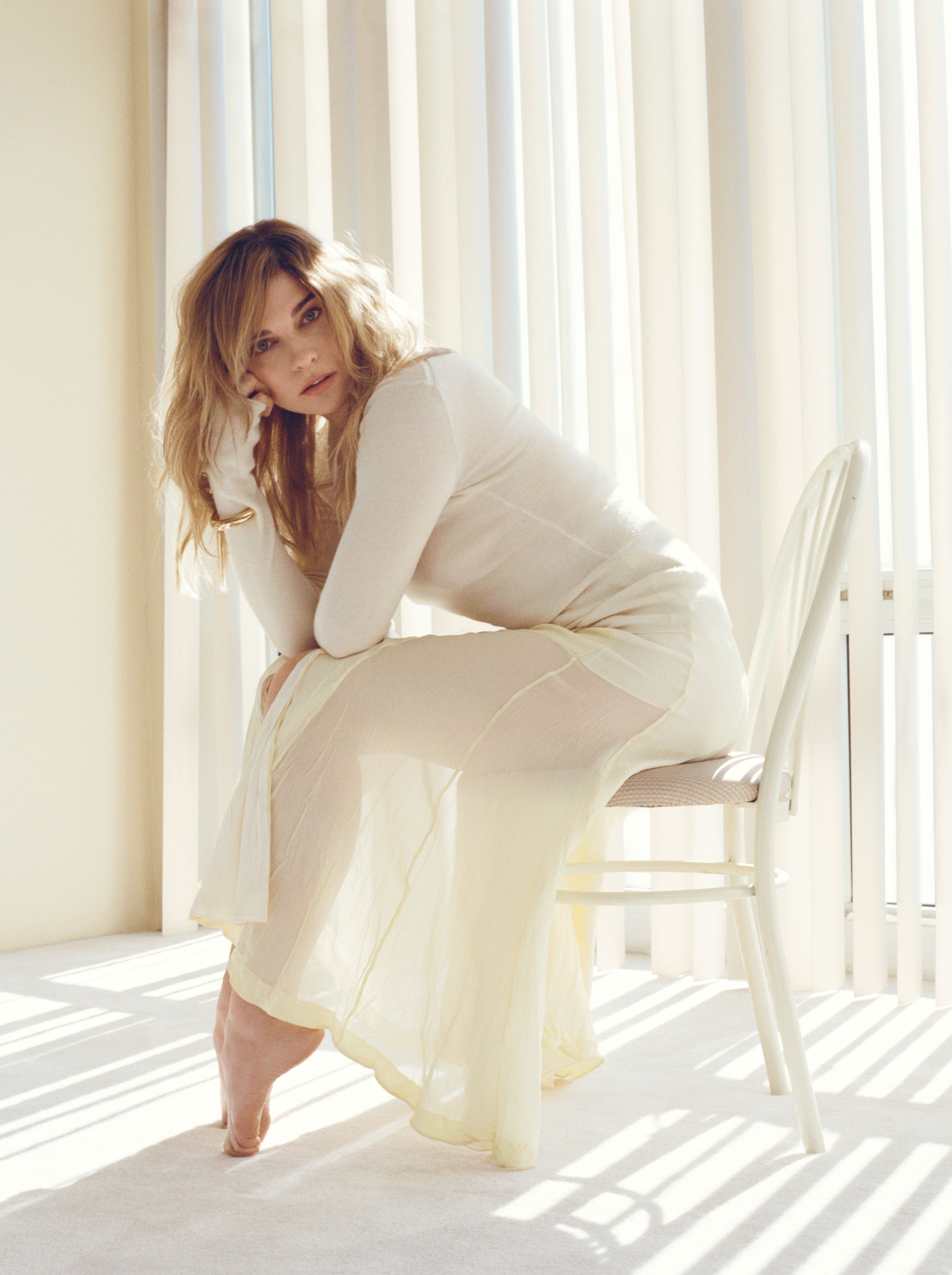
"Mary Hollis and I are both terrified that this is going to air and we're no longer going to be welcomed in Massachusetts because we've just butchered the accent so badly."
That she’s of interest to Hollywood gossip rags won’t be particularly surprising to fans who have watched her star steadily rise. But Murphy feels like she entered quarantine as a largely unknown actor on a “sweet Canadian show” and emerged several months later to a noticeable shift. Suddenly she was getting recognized on the streets, her whereabouts tracked on social media.
“It’s weird to be this person now. Because going into [acting], it wasn’t fame at all that I was after,” she says. “I certainly took anonymity for granted. It is a strange thing to know that you go somewhere and people are looking. And I know that sounds kind of like a silly statement, to be aware that you’re being watched.” (To the fan, the other day, who pretended to snap a picture of a friend on the street as a guise to capture Murphy mid-stroll: She saw you, she knows what you were doing, and she would’ve done the same damn thing if she saw a celebrity.)
Whether Murphy has fully grasped this new level of fame and fandom or not, she’s about to launch further into the stratosphere, thanks to her high-profile role on Russian Doll. She teases that she plays a “1982 version of a character.” The role is a bit of a dream come true for Murphy, who says filming in New York City has been a bucket-list item, not to mention the period-piece element of it all (“We were shooting in the subway the other day, and all the subway cars had ads [from] 1982. … It’s the closest I will ever come to time-traveling.”). And then there's working alongside Natasha Lyonne, whom Murphy describes as “such a creature from a different planet, in the most mesmerizing way.”
And perhaps for fear of jinxing herself, à la her last published efforts at predicting the year ahead, Murphy offers vague but optimistic plans for the future. She has some voice work lined up, and her fingers are crossed for a second season of Kevin Can F**K Himself along with a few movie offers. From theater to superhero films, she’s not ruling anything out.
“For the first time, I have prospective work going forward as opposed to not. I’m open really to whatever comes down the path that is exciting and involves good, not asshole, people.”
As for her status as an Emmy winner, she hasn’t had time to process it (or even hold the statue) due to her busy filming schedule. She’s still not sure where she’ll display the trophy. “I don’t want to build a mantel to put an Emmy on. But I don’t want to be one of those people that’s like, ‘Meh, it’s in my bathroom. I’m using it as a doorstop.’ There has to be some kind of middle ground, between pretentious and rude.”
For now, she settles on a bookshelf, placed between a few unassuming knickknacks and those novels she’s been meaning to read.
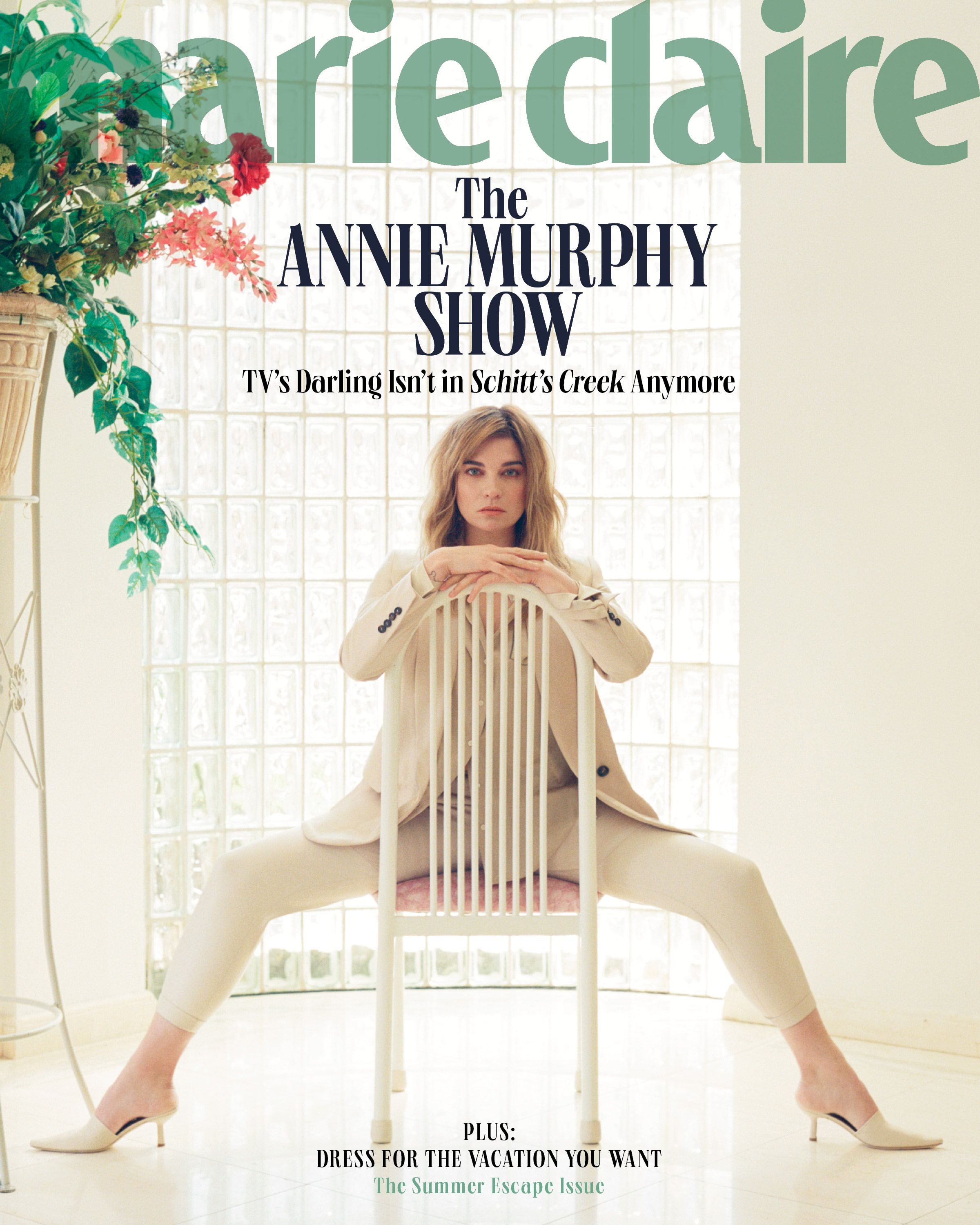
BRUNELLO CUCINELLI JACKET, $4,495, BLOUSE, $1,995, AND LEATHER PANTS, $3,995; BY FAR SHOES, $465.
A version of this story appears in the Summer 2021 issue of Marie Claire.
Fashion Editor: J. Errico | Hair: Christopher Naselli at The Wall Group | Makeup: Gita Bass at The Wall Group | Manicure: Nori Yamanaka for Chanel | Production: Anima Studios
MORE FROM OUR DIGITAL ISSUE



Neha Prakash is Marie Claire's Entertainment Director, where she edits, writes, and ideates culture and current event features with a focus on elevating diverse voices and stories in film and television. She steers and books the brand's print and digital covers as well as oversees the talent and production on MC's video franchises like "How Well Do You Know Your Co-Star?" and flagship events, including the Power Play summit. Since joining the team in early 2020, she's produced entertainment packages about buzzy television shows and films, helped oversee culture SEO content, commissioned op-eds from notable writers, and penned widely-shared celebrity profiles and interviews. She also assists with social coverage around major red carpet events, having conducted celebrity interviews at the Met Gala, Oscars, and Golden Globes. Prior to Marie Claire, she held editor roles at Brides, Glamour, Mashable, and Condé Nast, where she launched the Social News Desk. Her pop culture, breaking news, and fashion coverage has appeared on Vanity Fair, GQ, Allure, Teen Vogue, and Architectural Digest. She earned a masters degree from the Columbia School of Journalism in 2012 and a Bachelor of Arts degree from The Pennsylvania State University in 2010. She lives in Manhattan with her husband and dog, Ghost; she loves matcha lattes, Bollywood movies, and has many hot takes about TV reboots. Follow her on Instagram @nehapk.
-
 Tyla's Coachella Outfit Pairs Dolce & Gabbana With Pandora
Tyla's Coachella Outfit Pairs Dolce & Gabbana With PandoraThe singer wore a gold version of the crystal bra made famous by Aaliyah.
By Amy Mackelden Published
-
 How Kate Middleton Is Influencing George's Fashion Choices
How Kate Middleton Is Influencing George's Fashion ChoicesThe future king's smart blazer is straight out of Princess Kate's style playbook.
By Amy Mackelden Published
-
 King Charles "Couldn't" Meet Prince Harry During U.K. Visit
King Charles "Couldn't" Meet Prince Harry During U.K. Visit"It could actually bring down a court case."
By Amy Mackelden Published
-
 Meet Nicholas Duvernay, the Actor Who Plays Zion in 'The White Lotus' Season 3
Meet Nicholas Duvernay, the Actor Who Plays Zion in 'The White Lotus' Season 3We can't stop thinking about his scene-stealing performance in the finale.
By Quinci LeGardye Published
-
 'The White Lotus' Season 4: Everything We Know
'The White Lotus' Season 4: Everything We KnowCreator Mike White has already started teasing where the next installment will be set—and who might be back.
By Quinci LeGardye Published
-
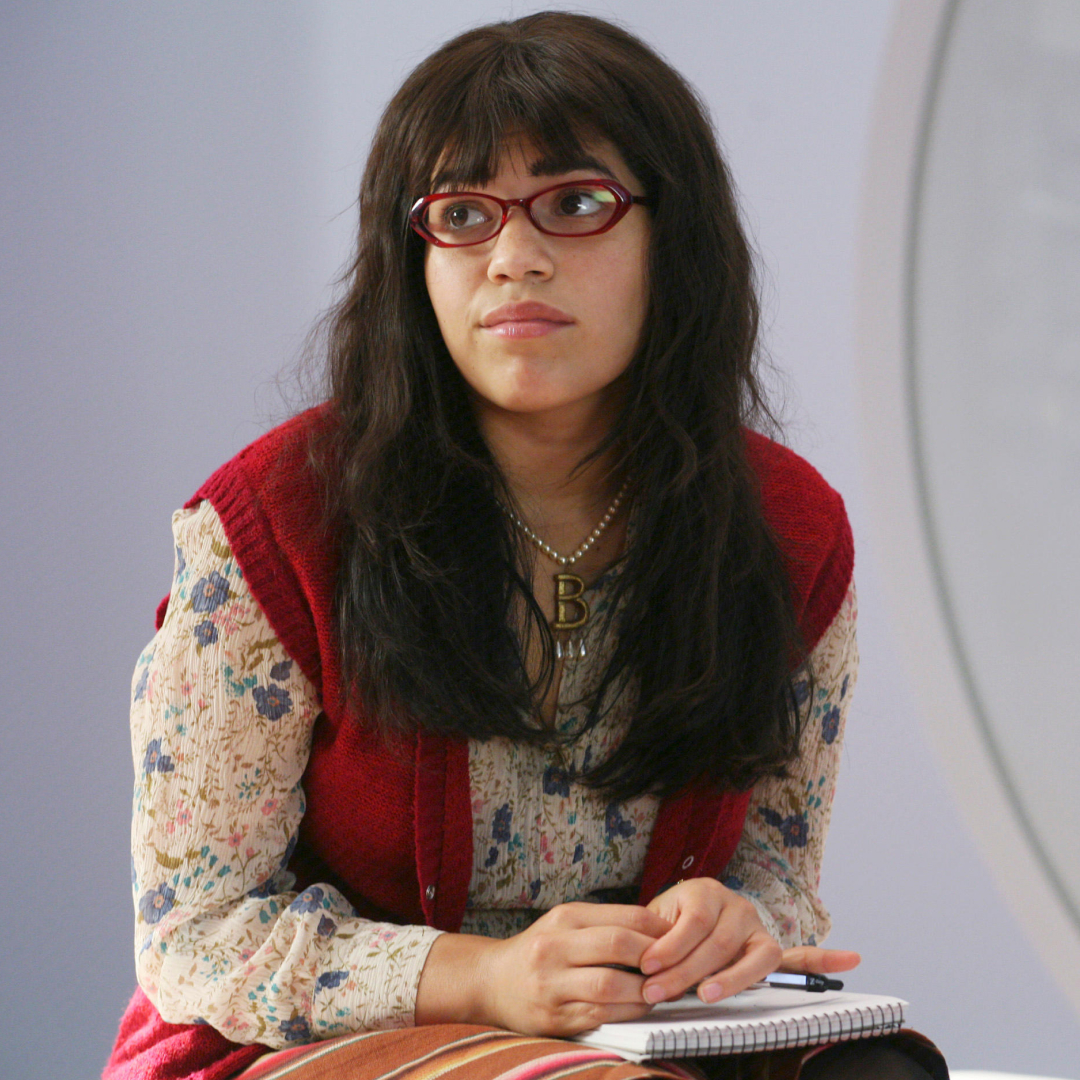 The Best Workplace TV Shows of All Time
The Best Workplace TV Shows of All TimeFrom iconic sitcoms to award-winning dramas.
By Iris Goldsztajn Published
-
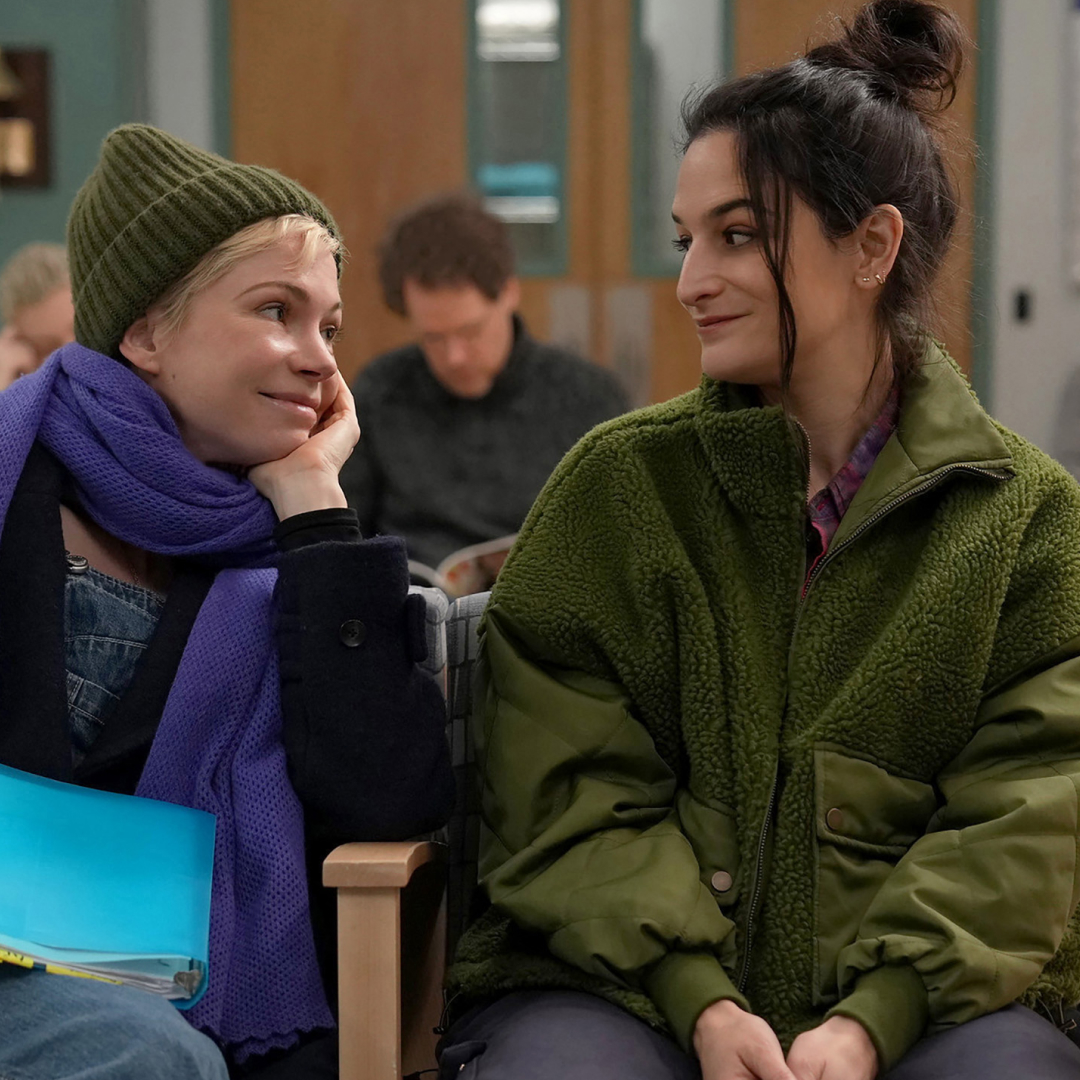 'Dying for Sex' Brought Jenny Slate to Life
'Dying for Sex' Brought Jenny Slate to LifeThe actress shares why playing Nikki in FX on Hulu's female friendship dramedy has felt like a life-changing part.
By Sadie Bell Published
-
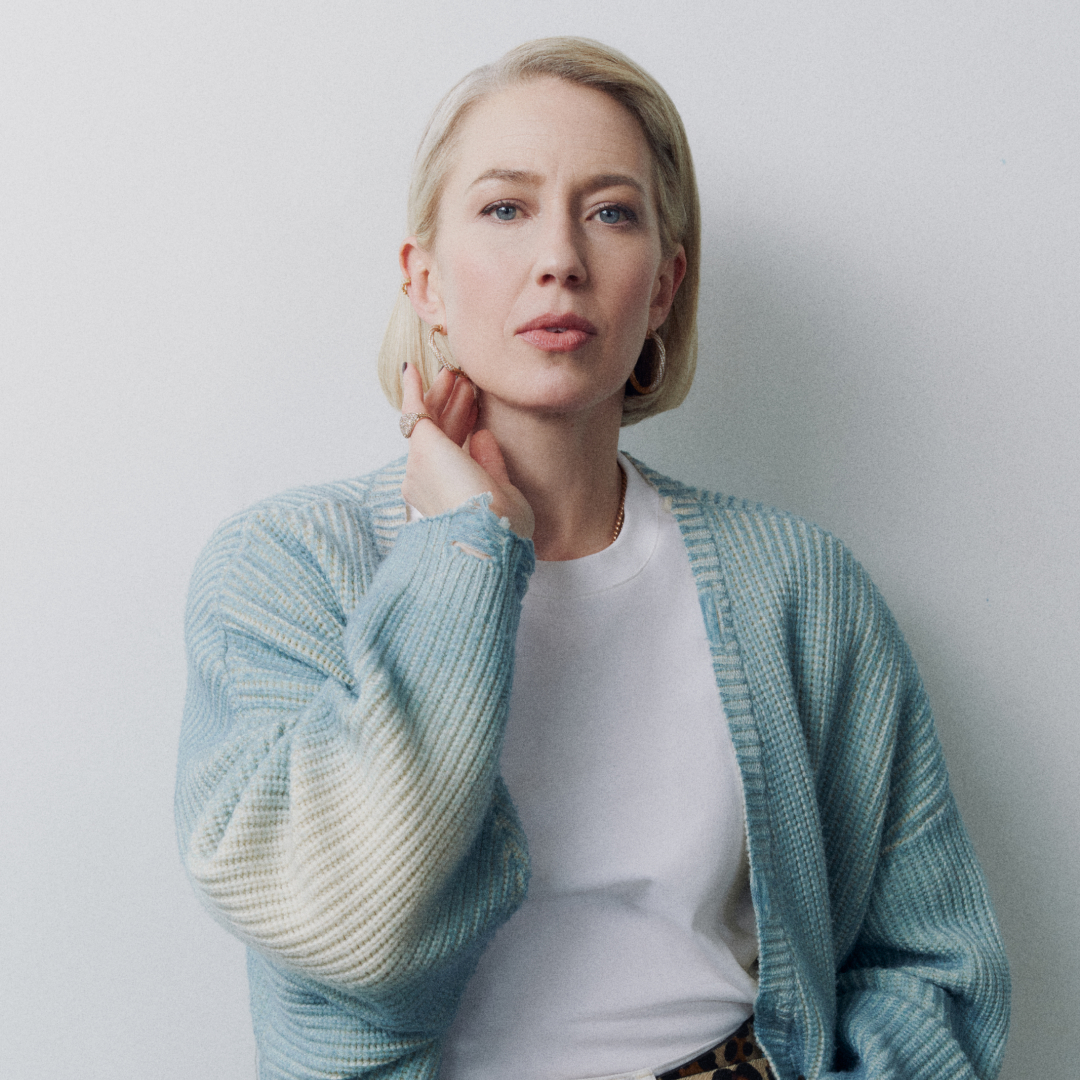 The Wild Ride of Carrie Coon
The Wild Ride of Carrie CoonLaurie's deep-set insecurities come to a head in episode 7 of 'The White Lotus,' allowing the actress to turn a "dark night of the soul" into an illuminating time.
By Jessica Goodman Published
-
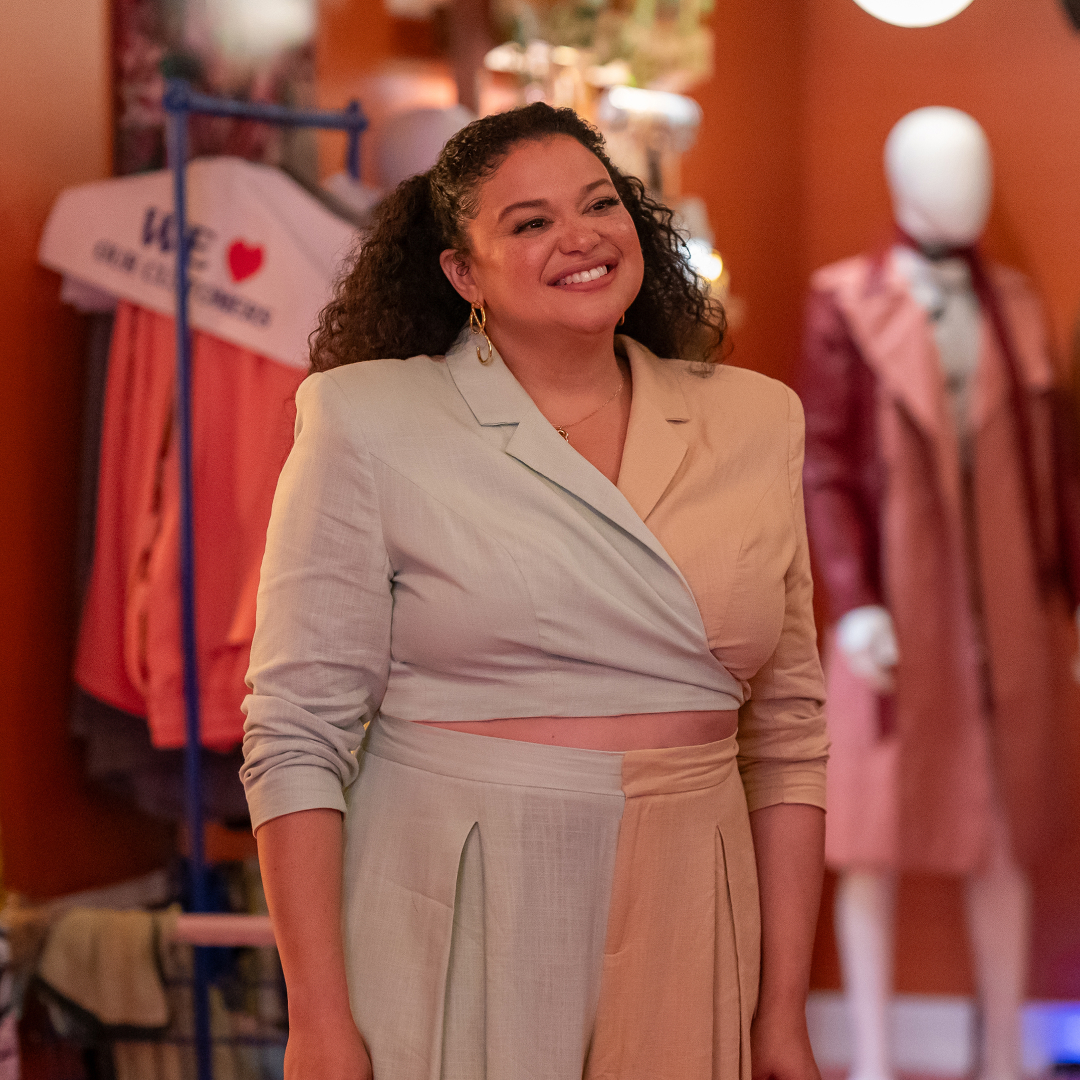 Meet the 'Survival of the Thickest' Season 2 Cast
Meet the 'Survival of the Thickest' Season 2 CastThere's so much to love about Michelle Buteau's Netflix comedy about a stylist looking for love and success.
By Quinci LeGardye Published
-
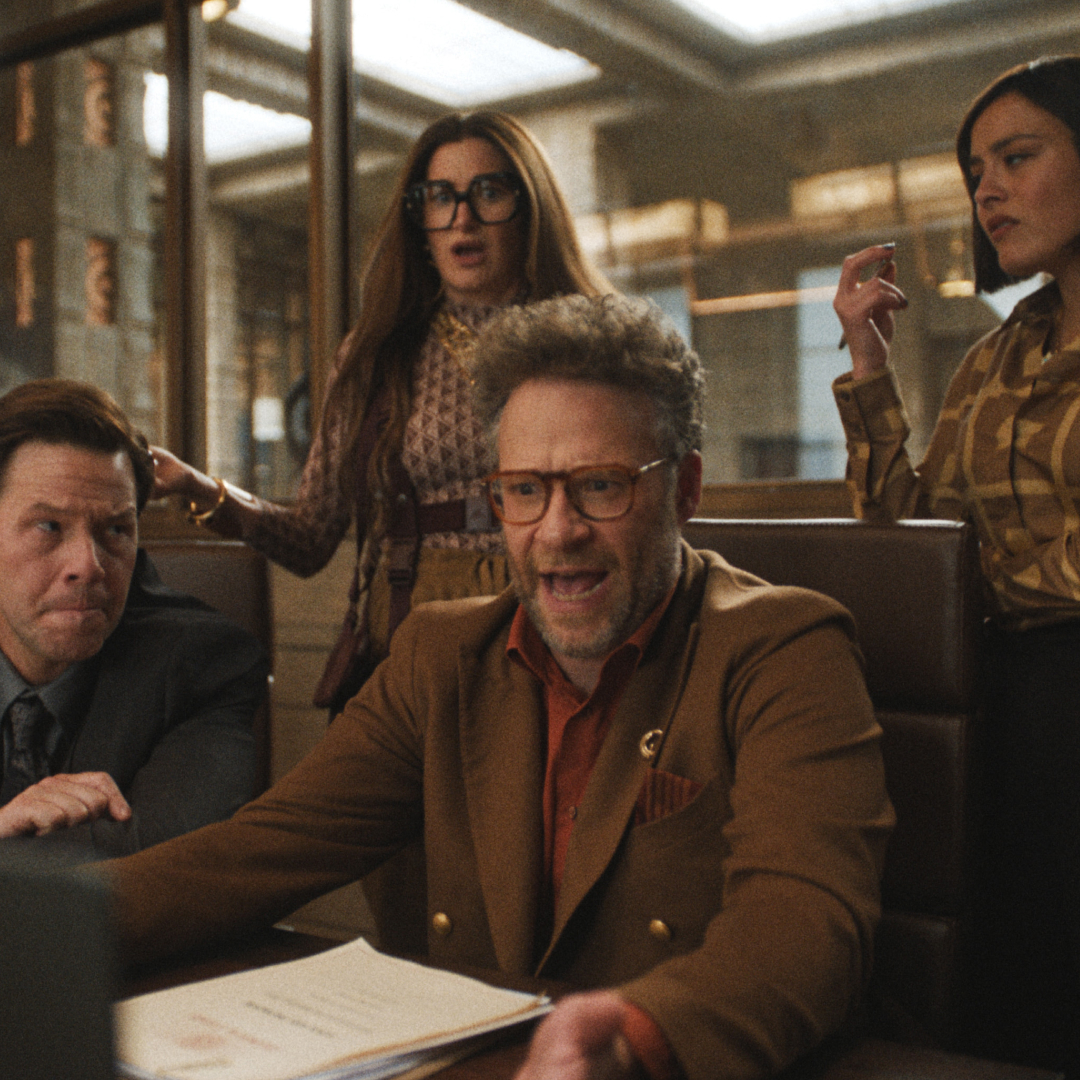 The Cast of 'The Studio': Your Guide
The Cast of 'The Studio': Your GuideThat's showbiz, baby!
By Quinci LeGardye Published
-
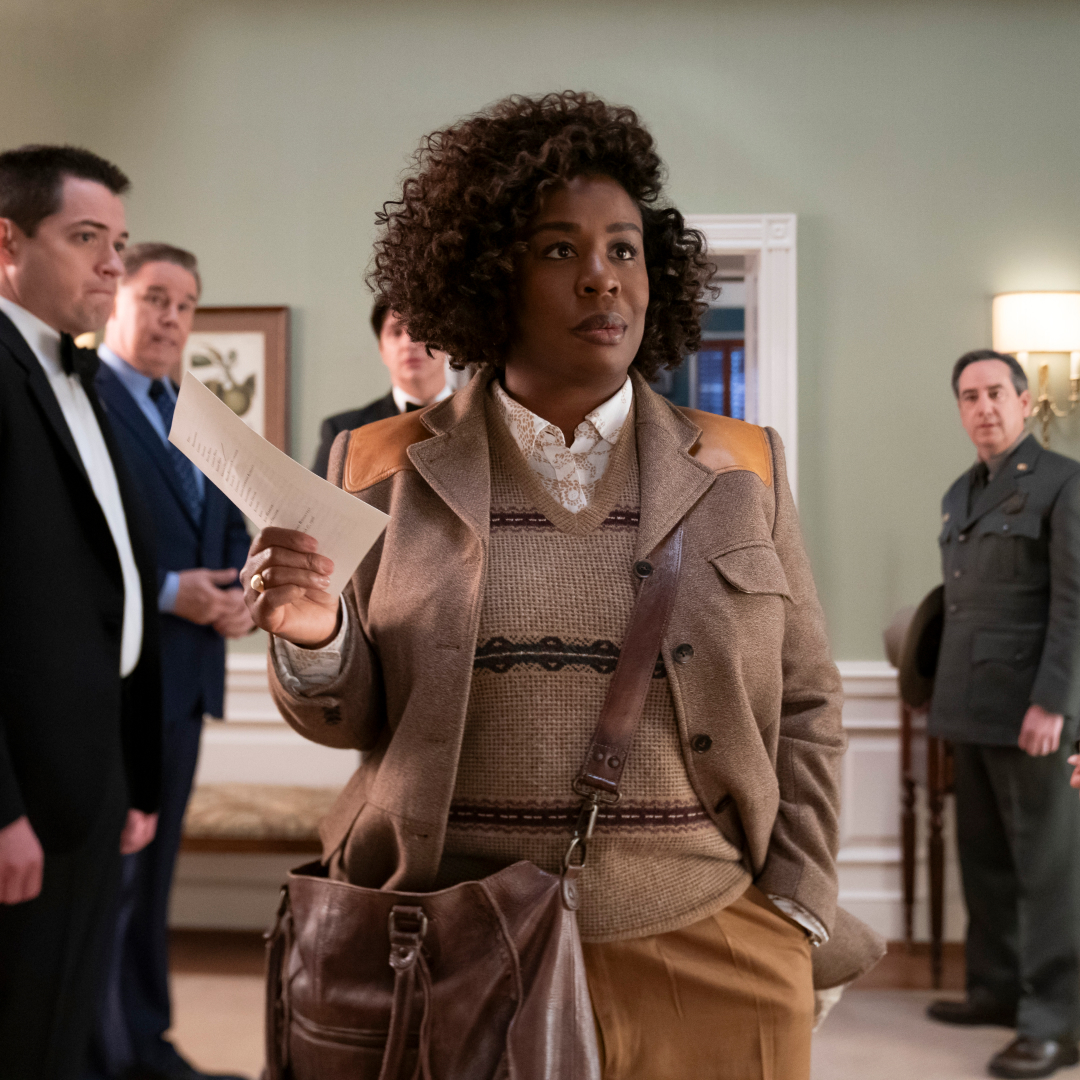 Where Was 'The Residence' Filmed? What to Know About the Location Transformed Into The White House
Where Was 'The Residence' Filmed? What to Know About the Location Transformed Into The White HouseThe Shondaland-produced Netflix series pulled off the largest-ever recreation of the Executive Mansion.
By Quinci LeGardye Published